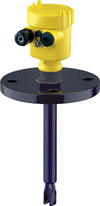
In the last few years the prices for mechanically- and chemically-resistant metals like Hastelloy and tantalum have risen considerably. Sensor manufacturers cannot absorb these drastic price increases in the long term and are forced to pass them on to their customers. Level and pressure manufacturers Vega offer a cost-effective alternative thanks to its development of new plastic-coated sensors. Modern synthetic materials are highly resistant and can be used in wide temperature ranges.
In many chemical applications the question of which sealing material to use for flange seals or sensor elements also arises. Often the sealing materials have to be selected individually for compatibility and this presents serious problems to sensor manufacturers and users. Since all the medium-wetted parts of plastic-coated sensors are protected, the user does not need to worry about the sealing materials. A standard solution for many different applications is thus possible, reducing stock keeping and service costs.
PTFE and PFA
The lining of pipes and the coating of primarily mechanical components and sensors has been used for corrosion protection in the chemical industry for a long time. Pressure-measuring transducers and displacer systems were protected mainly with PTFE.
Fluorine plastics like PTFE or PFA are particularly suitable for coating all kinds of sensors. Their chemical resistance is greater than that of almost any other material, which makes their use possible in a wide range of applications.
The temperature resistance of these synthetic materials spans a wide range. They can be used at temperatures as low as -200°C and can also be used at temperatures of up to +200°C without problem.
The smooth and non-adhesive surface of fluorine polymers means considerably less build-up than on a metallic probe and with a roughness depth of 0,3 nm or better, the use of such sensors suits pharmaceutical applications.
In the past the limited diffusion resistance of fluorine plastics was a problem, but this has been improved on considerably in the last few years. Modern PTFE materials, even in the form of a relatively thin layer, can now be used in chlorine applications.
Today, measuring principles that are particularly suitable for chemical and pharmaceutical production also come in versions with a rugged plastic coating, thus expanding their application spectrum considerably.
Examples of coated instruments
The Vegaswing 63 vibrating level switch with PFA/ECTPE coating can be used in applications such as monitoring the levels of storage vessels and reactors, to dry run protection of pumps.

The guided microwave Vegaflex 63 in rod and cable version with PFA coating has application in storage tanks with aggressive liquids or for sterile areas.
The Vegapuls 63 radar sensor is an ideal solution for continuous non-contact level measurement of aggressive liquids. The range of application extends from simple storage vessels to complex level measurement in reactors with multistage agitators and aggressive media.
For more information contact John Groom, Vega Instruments SA, +27 (0)11 958 1901, [email protected], www.vega.com
| Tel: | +27 11 795 3249 |
| Email: | [email protected] |
| www: | www.vega.com/en/home_za |
| Articles: | More information and articles about VEGA Controls SA |

© Technews Publishing (Pty) Ltd | All Rights Reserved